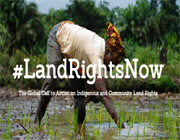
On 25 February 2014, Kapaeeng Foundation (KF) launched its human rights for the year 2013 entitled “Human Rights Report 2013 on Indigenous Peoples in Bangladesh” at the CIRDAP Auditorium in Dhaka. The report, published with the support of Oxfam and European Union, was edited by Dr. Dalem Chandra Barman, vice-chancellor of ASA University of Bangladesh and advisor of KF and Mong Sing Neo, former coordinator of KF.
Eminent educationist and former vice-chancellor of Jahangirnagar University Dr. Zillur Rahman Siddiqi was present in the launching programme as chief guest while it was presided over by Mr. Mangal Kumar Chakma, advisor of Kapaeeng Foundation. Welcome speech was delivered by Oxfam’s Project Coordinator Mr. Saikat Biswas. Vice-chancellor of ASA University of Bangladesh Dr. Dalem Chandra Barman, European Union’s Programme Manager of Fabrigio Sinesi, Oxfam Programme Manager Mr. M B Akhter and Dhaka University teacher Prof. Mesbah Kamal also addressed the launching programme. Bablu Chakma, Project Coordinator of Kapaeeng Foundation made a presentation on Human Rights Report 2013.
In his speech, Professor Zillur Rahman suggested to the human rights report needs to reach all the political parties and policy-makers in the country irrespective of their ideologies. He added that state is responsible for the protection of human rights of indigenous peoples. Professor Zillur Rahman Siddiqui urged the civil society members to take the responsibility to bring the issues of human rights of indigenous peoples in Bangladesh to wider discussion.
Sanjeeb Drong said that the recent forced migration of indigenous peoples to India proves that situations of indigenous peoples in the country are not good. He also expressed his concerns over forced religious conversion of indigenous children. He appealed the civil society to come forward as the human rights violations against indigenous peoples are increasing at an alarming rate.
Professor Mesbah Kamal said indigenous peoples in the country are not enemies of the state. They merely want to establish their just human rights that they deserve to enjoy as the citizens of the country. He expressed his hope that political parties would come forward to implement the election pledges.
The languages, cultures and customs of indigenous peoples deserve respect, said Mr. Fabrigio Senesi, the representative of European Union. He urged government to come forward to implement the CHT Accord and protect and promote the rights of indigenous peoples in the Country.
It is noteworthy that the human rights report is a result of Kapaeeng Foundation’s documentation and research work of the human rights situations of the indigenous peoples in Bangladesh throughout the year. Kapaeeng has been publishing its annual human rights on indigenous peoples in Bangladesh since 2007. The Human Rights Report 2013 was prepared by eight contributors, namely, Binota Moy Dhamai, Assistant General Secretary of Bangladesh Indigenous Peoples Forum; Bipasha Chakma, Research Coordinator of KF; Bablu Chakma: Project Coordinator of KF; Sayon Dewan, Member of Indigenous Peoples’ Human Rights Defenders’ Network; Gouranga Patra, executive director of Patra Sampraday Kalyan Parishad; Manik Soren, Member of Indigenous Peoples’ Human Rights Defenders’ Network; Falguni Tripura: Advocacy Facilitator of KF; and Mangal Kumar Chakma: Advisor of KF.
Executive Summary of the Human Rights Report 2013:
Bangladesh often affirms its commitment to promote and protect human rights through its unequivocal pledge to uphold the principles and purposes of the UN Charter, international peace and security, respect for international law and rejection of colonialism and racism. However, different state agencies of Bangladesh have been directly engaged in interfering with the enjoyment of the human rights of indigenous peoples enshrined in the international laws for long, let alone the state authorities preventing violations of these rights by state agencies and other non-state actors. During the second cycle of review under the UPR mechanism on Bangladesh held at the UN Human Rights Council in Geneva on 29 April 2013, for example, the government of Bangladesh provided incomplete and inaccurate information on implementation of the CHT Accord and constitutional recognition of indigenous peoples to the UPR session, which has proved non-compliance attitude of government’s commitment to the international human rights mehcanisms.
Human Rights Situation
Human rights of indigenous peoples in the CHT and plain land are still being violated in an alarming manner. In most cases, the state authority fail to investigate the alleged human rights violations properly, which were committed directly by state-machineries as well as by third party such as Bengali settlers, illegal land grabbers, private companies and local administrations. The indigenous victims of human rights violations are often neither provided with essential protection nor co-operated in filing charges against the perpetrators. As a result, the offenders usually do not face any prosecution and punishments. State being the prime duty bearer, its reluctance and failure to meet its obligation to respect, protect and fulfill human rights of indigenous peoples are facilitating perpetrators to commit offensive activities to a major degree. As a result, discrimination and violence against indigenous peoples including women and children continue to be a serious issue of concern in the present day.
In 2013, the numbers of human rights violations against indigenous peoples were intensified in some particular issues. At least 11 indigenous people including 4 women, 3 from CHT and 8 others from plains, were killed. In connection with fabricated cases and incidents, law-enforcing agencies and security forces arrested 42 indigenous persons including 31 from CHT. At least 8 communal attacks, 6 in CHT (including Chiitagong EPZ) and 4 in plains were conducted by the Bengali settlers and Bengali land grabbers, while houses and properties of at least 346 families, 275 from CHT and 71 from plains, were destroyed and looted. At least 47 houses including 1 from plains were set on fire and burnt to ashes, while around 2000 people of 400 families in CHT fled away to ‘no man’s land’ adjacent to neighboring Indian state due to communal attacks conducted by Bengali settlers. In some cases, while these violations were committed by influential Bengali miscreants as non-state actors, the state actors such as members of security forces and law enforcing agencies played either supportive or passive roles.
Rights to Land and Natural Resources
Violation of rights of indigenous peoples to land and natural resources is leading to enormous illegal land encroachment by mainstream populations, politically powerful individuals and government. For instance, most indigenous families in the northwest of Bangladesh lost their traditional lands as administration listed them as ‘Khas’ (state-owned). The ILO Convention No. 107 on Indigenous and Tribal Populations which was ratified by Bangladesh has been a safeguard for traditional land rights of indigenous peoples. However, the government itself ignores the fact that under international human rights law, indigenous peoples have right to their traditional lands. This is not only denying indigenous peoples’ access to their traditional lands but also leading to frequent violent clashes between indigenous peoples and land grabbers of mainstream population.
Land grabbing has been significantly intensified in 2013 compared to 2012. In 2013, around 3792 acres of lands in the CHT were either grabbed or went under process for occupation and acquisition while 103 bighas of land in the plains were occupied. Of the total grabbed land in CHT, 3717 acres of lands were grabbed by mainly outsider private parties and influential persons and 75 acres by the government. One of land grabbers was wife of a former Forest and Environment Minister Mr. Hasan Mahmood Chowdhury. Throughout the year, 26 families were evicted from their homesteads and 1062 families were under threat to eviction. A total of 66 families were attacked in the plain land in connection with occupation of lands of indigenous peoples. At least 200 indigenous families fled to India from north Bengal during last five years due to land grabbing, false cases and intimidation, physical assault, sexual harassment against indigenous women by Bengali land grabbers. Besides, land grabbers with the help of forest officials chopped down 500 betel leaf trees in Sylhet which are the main means of livelihood of indigenous Khasi people. Furthermore, allegations of irregularities and misappropriation of climate change and forestation projects in CHT which ultimately hamper livelihood of marginalised people have raised question among the people.
Situation of Indigenous Women
Despite considerable movement of indigenous peoples in the country throughout the past decade, indigenous women remain largely marginalized in terms of socio-economic status. Government’s policy of racial discrimination also refuses to reserve seats of indigenous women in local government bodies and national legislative body. There are also some political factors contributing to turn indigenous women and children the most vulnerable and disadvantaged section of the country. Having non-recognition as indigenous peoples in the constitution, lack of political participation in both types of the state political structures and traditional institutions, lack of access to justice and impunity of the perpetrators, non-implementation of CHT Accord of 1997 and militarization in CHT have left the indigenous people including women completely vulnerable. Most commonly reported form of violence against indigenous women and girls in the country are rape/gang rape, attempt to rape, killing after rape, killing, physical assault/ molestation, abduction, sexual harassment, and trafficking. The numbers of sexual harassment and trafficking have been added as new forms of violation in 2013 in CHT.
In 2013, a total of 67 indigenous women and children across the country, 54 from the CHT and 13 from plain land were subjected to violence. Of them, 15 indigenous women and children (12 from CHT and 3 from plain) were raped. A father of a rape victim committed suicide over the trauma for being unable to carry on the sexual assault of her daughter. Five indigenous Tripura girl children from a madrasa in Dhaka were rescued as they were taken from CHT to convert into Islam by force. Again, police also rescued 3 indigenous girls from Faridpur-Rajbari crossing across Dhaka-Khulna highway while they were being trafficked out to India after enticing into providing them well-paid jobs in that country. Besides, 6 indigenous women were abducted and 16 indigenous women were physically assaulted and molested. 69% of the all women victims were under age of 18. On the other, 89% of the perpetrators are found from Bengali settlers and land grabbers, while 7% were indigenous origin and 4% of the perpetrators are from security forces.
There are many pending cases on human rights violations against indigenous women in different courts of Bangladesh because of unanticipated problems such as lack of follow up the particular case, complex court procedures, lack of awareness, inadequate of legal aid support centers, less interest to run a case for prolong process, lack of financial capacity, rely on government tol run victims/victim families cases on their behalf. It is important to mention that in September 2013 the Women and Children Repression Prevention Tribunal in Chittagong gave verdict to hang perpetrators in a rape case. This news may bring trust to indigenous women that there is consequence for rape and consequence in non-discriminatory irrespective of one’s ethnic background. It is realized that due to continuous impunity, indigenous women are increasingly becoming victims of sexual violence.
Situation on Education and Child Rights
The sufferings of the indigenous children in Bangladesh are twofold—their rights are infringed firstly, because they are indigenous, and secondly, because they are children. A major issue facing indigenous children is in terms of their right to primary education in own mother tongues. As a result, indigenous children in Bangladesh are lagging far behind their Bengali counterparts in primary education. Furthermore, the textbooks used for educating the children at primary level (and sometimes even at secondary levels) often contain distorted and misleading information about their cultures, languages, beliefs, and ways of life. This is contributing to creation of wrong perception of the naive Bengali kids in one hand, and demotivating the indigenous children while studying.
Many indigenous children who work as ‘maids’ or domestic workers continue to live a very appalling life across different parts of Bangladesh. It is often the case that indigenous children are taken away from their homes and employed in the well-to-do families to do household activities like cooking, cleaning, baby sitting, and so on. As a result, the children doing so many activities get deprived of their normal way of life and many of their rights enshrined in the Convention on the Rights of the Child are violated.
280 indigenous candidates of 34th Bangladesh Civil Service (BCS) recruitment were deprived of their right of enjoying 5% quota enshrined in the civil services recruitment policies due to a controversy arose around the quota system in Bangladesh in 2013. The quota policy has remained merely on papers, as 5% quota for indigenous candidates has never been maintained properly ever since its inception. A study shows that from 24th to 33rd BCS recruitments only 275 candidates were recruited out of 2051 available posts for indigenous candidates.
Implementation of Election Pledges & CHT Accord
The issue of implementation of the CHT Accord, an elction agenda of Awami League in 2008, had only been in confinement to the repeated utterence of promises during its tenure 2009-2013. With exceptions to some initiatives including reconstituion of committees as part of the implementation process, the government did not take any effective measure towards implementation of core issues of the Accord. For example, the government proved to have spelled abject failure in amending contradictory provisions of CHT Land Dispute Resolution Commission Act of 2001 during the last five-year tenure. The reasons behind non-implementation of the Accord by government even being in the power for the second time are, among others, lack of sincerity and good will of the government in implementing the Accord and possession of ultra-nationalist, undemocratic and communal outlook amongst the policy-makers.
Another important elction agenda of Awami League in 2008 was to form a land commission to restore dispossessed land of indigenous peoples in plain lands. The government did not take any action in this regard or even did not recall the issue at all.
Recommendations
(1) To take effective measures to fully implement the CHT Accord of 1997 with a declared time-frame for a road map and solving land disputes of Indigenous Peoples in CHT and plain lands.
(2) To stop the systematic and forcible displacement of Indigenous Peoples from their ancestral lands and to develop legal mechanisms to save the illegal land dispossessions of Indigenous Peoples.
(3) To form a separate land commission for plain land Indigenous Peoples for restoration of dispossessed land.
(4) To stop communal violence and physical abuse against indigenous women and children and to conduct judicial inquiries into the communal violence and abuses against indigenous women.
(5) To provide constitutional recognition to the Indigenous Peoples as per international human rights instruments ratified by the Government of Bangladesh.
(6) To conduct investigation to the human rights violations against Indigenous Peoples by National Human Rights Commission regularly.



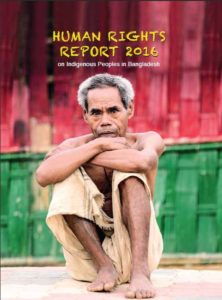
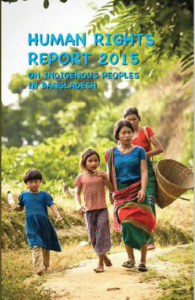
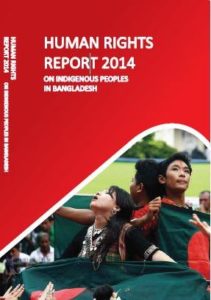
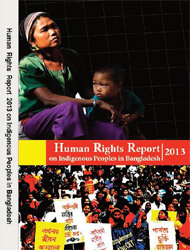
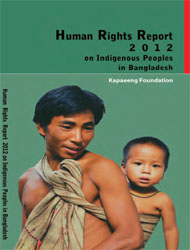
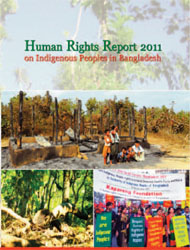
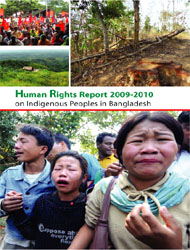

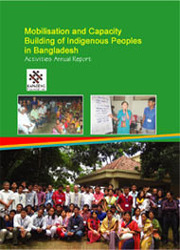



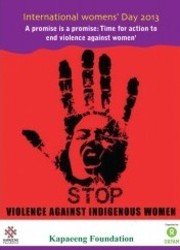
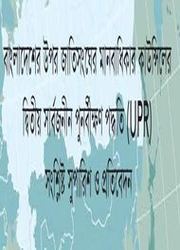
 February 26th, 2014
February 26th, 2014  KapaeengUser
KapaeengUser  Posted in
Posted in 